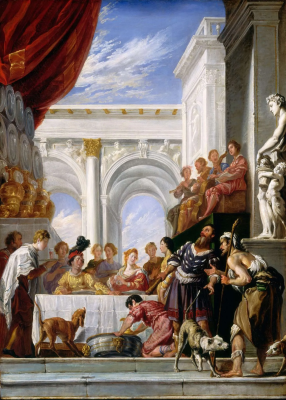Gospel in Art: At his gate was a poor man named Lazarus, covered with sores

The Parable of Lazarus and the Rich Man, Domenico Fetti, 1620 © National Gallery of Art, Washington, Samuel H Kress Collection
Source: Christian Art
Gospel of 28 September 2025
Luke 16:19-31
At that time: Jesus said to the Pharisees, 'There was a rich man who was clothed in purple and fine linen and who feasted sumptuously every day. And at his gate was laid a poor man named Lazarus, covered with sores, who desired to be fed with what fell from the rich man's table. Moreover, even the dogs came and licked his sores. The poor man died and was carried by the angels to Abraham's side. The rich man also died and was buried, and in Hades, being in torment, he lifted up his eyes and saw Abraham far off and Lazarus at his side. And he called out, "Father Abraham, have mercy on me, and send Lazarus to dip the end of his finger in water and cool my tongue, for I am in anguish in this flame." But Abraham said, "Child, remember that you in your lifetime received your good things, and Lazarus in like manner bad things; but now he is comforted here, and you are in anguish. And besides all this, between us and you a great chasm has been fixed, in order that those who would pass from here to you may not do so, and none may cross from there to us." And he said, "Then I beg you, father, to send him to my father's house - for I have five brothers - so that he may warn them, lest they also come into this place of torment." But Abraham said, "They have Moses and the Prophets; let them hear them." And he said, "No, father Abraham, but if someone goes to them from the dead, they will repent." He said to him, "If they do not hear Moses and the Prophets, neither will they be convinced if someone should rise from the dead." '
Reflection on the painting
Most of us live on fairly ordinary meals. A bit of breakfast to start the day, something simple at midday, and another modest meal in the evening. Perhaps, now and again, we enjoy a special occasion, like a wedding or a great celebration, where there are several courses and the table feels like a real feast. But that is the exception, not the rule. For many in our world, even three simple meals a day would be a great luxury. Many survive on just one. Against this backdrop, Jesus tells the story of a rich man who dined lavishly every single day, enjoying a five course meal, the kind of abundance that most people in his time could never imagine. At his very gate, however, lay Lazarus. He was hungry, sick, and hoping for nothing more than the crumbs that fell from the rich man's table. Those crumbs would have been enough to keep him alive. The wealthy man could easily have spared a little, yet he ignored Lazarus completely... as if he were invisible.
The tragedy of the story is the complete lack of compassion of the rich man. He never noticed Lazarus, but God did. In death, Lazarus was carried to a banquet in heaven, honoured at Abraham's side, while the rich man found himself cut off, even denied a drop of water. The message is sharp: the rich man had the means to change Lazarus' life before death, but his focus on worldly pleasures left him spiritually blind. Jesus is reminding us that each of us, in our own way, can make a difference. Few of us live with the kind of excess described in the parable (many of us today are struggling with rising costs and political uncertain times in the world). Yet even in times of difficulty, there is always something small we can share: a little time, a listening ear, a gesture of kindness, or practical help for someone worse off. In God's eyes, even the smallest act of generosity can turn another person's hunger into an experience of hope.
I had the pleasure of giving a lecture in Washington two weeks ago for The Catholic Art Institute, partnered with The Catholic University of America in Washington DC. I saw this painting attributed to Domenico Fetti for the first time. A truly superb painting. We see a grand banquet scene framed by gleaming white marble architecture. The Baroque figures, dressed in multicoloured silk and velvet robes are seated around a table lavishly set with a crisp white cloth. Other guests stand or even play music, creating an atmosphere of festive opulence. On the left side there is a lavish display of silver. On the right, a white marble sculpture stands of Bacchus, taking grapes out of a basket held by a putti. The figure standing closest to us, the viewer, is Lazarus, in the bottom right. The dogs are licking his sores. He is looking onto the lavish display, without even being thrown a crumb. He is excluded and simply waiting for someone to show some compassion.
LINKS
Gospel in Art: https://christian.art/
Today's Reflection: https://christian.art/daily-gospel-reading/luke-16-19-31-2025-2/


















